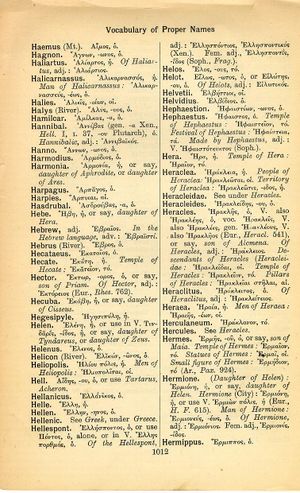Hannibal
Λυποῦντα λύπει, καὶ φιλοῦνθ' ὑπερφίλει → Illata mala repende; amantem magis ama → Den kränke, der dich kränkt, und liebe den, der liebt
English > Greek (Woodhouse)
Ἀννίβις (gen. -α Xen., Hell. I, I. 37, -ου Plutarch), ὁ.
Hannibalic, adj.: Ἀννιβαϊκός.
Latin > English (Lewis & Short)
Hannĭbal: (Annibal), ălis (ālis, Enn. Sat. 14 Vahl.), = Ἀννίβας [Phoen.],
I a Punic surname. The most celebrated of the name is Hannibal, son of Hamilcar, the leader of the Carthaginians in the second Punic war, Nep. Han. 1 al.; Liv. 21, 1 al.; Hor. C. 4, 8, 16; Cic. de Or. 1, 48, 210 al.: et Romani suum Hannibalem habent, Liv. 27, 16, 10. —Prov.: Hannibal ad portas, of imminent and great danger, Cic. Fin. 4, 9, 22: Mithridates, odio in Romanos Hannibal, a Hannibal, Vell. 2, 18, 1.
Latin > French (Gaffiot 2016)
Hannĭbăl,⁹ ălis, m., fils d’Hamilcar, chef des Carthaginois dans la seconde guerre punique : Nep. Hann. ; Cic. ; Liv. || Hannibal ad portas Cic. Fin. 4, 22, Hannibal à nos portes = danger pressant.

